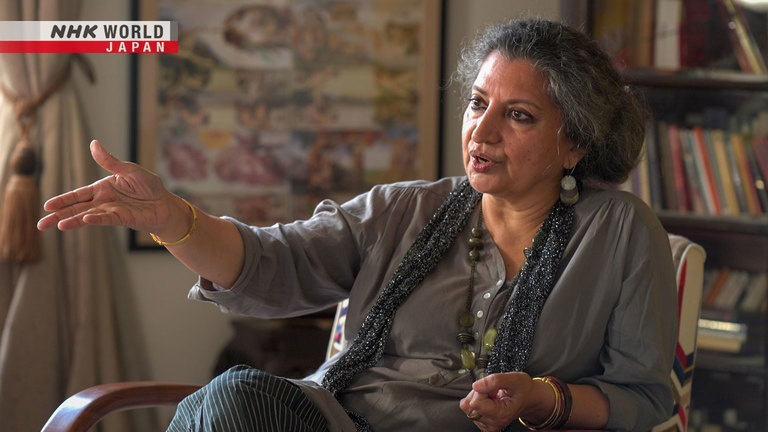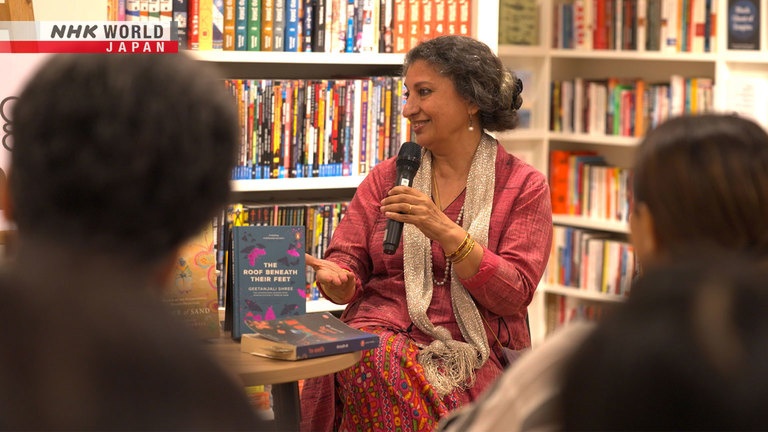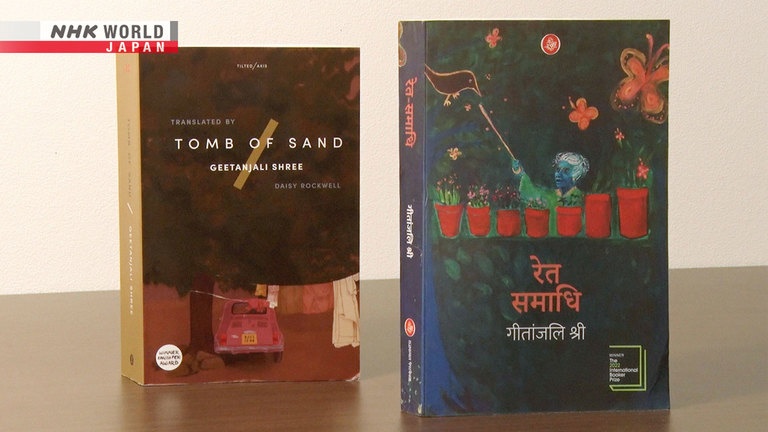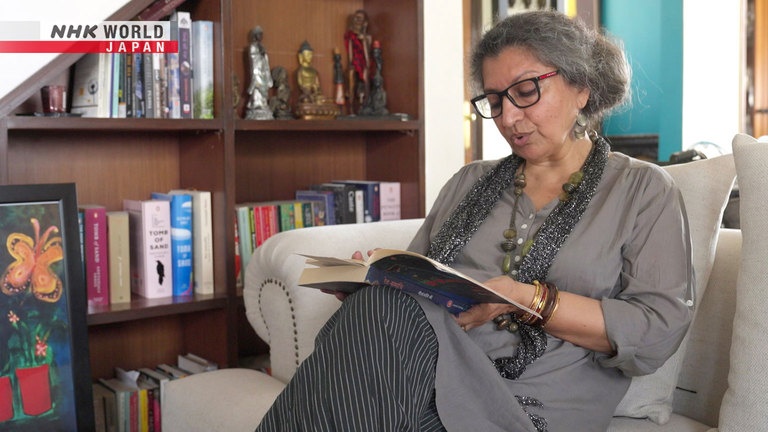A Story Beyond Boundaries: Geetanjali Shree / Novelist
The first Indian author to win the International Booker Prize talks about crossing "boundaries," a major message of her novel, and how her first language Hindi serves as a source of her imagination.




Transcript
Direct Talk
The International Booker Prize
is a prestigious literary award for
novels translated into English.
The winner of the 2022
International Booker Prize
is Tomb of Sand by Geetanjali Shree,
translated by Daisy Rockwell.
Geetanjali Shree's award
was a great achievement.
It was the first time for the prize
to be awarded to a work
written in an Indian language.
Geetanjali Shree
Novelist
Behind me and this book lies a rich
and flourishing literary tradition in Hindi.
The main character of Tomb of Sand
is an 80-year-old woman who confronts
and transcends various boundaries,
such as gender, age, and national borders.
We are always dealing with boundaries.
We are always questioning the boundaries.
Is there any need for that?
Should it be there, should not be there?
How do we get around it?
And we are always trying.
The writer Geetanjali Shree
tells us about her mother tongue
as a source of her imagination,
and how to deal with boundaries.
A Story Beyond Boundaries
The writer Geetanjali Shree
is based in Delhi, India.
During the year since receiving the award,
she has been busy with many events
at home and abroad,
including book-signing sessions and lectures.
Today, an event is being held
to commemorate the first anniversary of her
winning the International Booker Prize.
The response to this
very first Indian accomplishment
has been very positive in her home country.
I really liked the book.
I thought it was
extremely well written.
It was detailed,
and there was this wit about it.
We don't see an ageing older woman necessarily
as the heroine in the cinema we watch,
or in books we read or
in podcasts we hear.
And that's what was really fresh
about this book.
Tomb of Sand is a translation
of the novel Ret Samadhi,
which was written in Hindi.
The story centers around an elderly woman.
Ma, an 80-year-old woman
living in North India,
is deeply depressed
after the death of her husband.
Gradually, however, she changes.
Despite her family's anxiety,
she sets her sights on leading a new life,
and living again!
So an elderly character is always...
I think, would have so many stories to tell.
There was just the back of the old woman.
And that image aroused my curiosity.
And slowly I began to wonder,
"Is she really tired of life?
Is she really ready to die?"
And then many other things
started happening and slowly the novel
unfolded and more and more
kept happening, evolving in the novel.
The story relates how an elderly woman
crosses various boundaries.
Despite her deep grief,
the first boundary she clears
is the wall of her room.
Her going through the wall is like
getting out of her comfort zone and security
into the open world and
discovering her own new path there,
and discovering or reinventing
or making a new world for herself.
These words appear on the first page:
"Once you've got women and a border,
a story can write itself."
Well boundaries are really...
Boundaries are always there.
There are gender boundaries
where we see,
you know, one gender belonging
in a certain space.
And we sometimes put the other gender
in a lower space,
in a less privileged space.
I mean, look at the
stereotypes in Japan about...
I remember there was something about
"Who is the perfect housewife
is the Japanese."
She had to
very much fulfill of, well, she was
supposed to, fulfill that perfect role,
but
that limited certain opportunities for her.
And those women who did not
want to remain just housewives
had to cross those boundaries.
So, you know, these are things
which make you aware of the boundaries
which you want to cross.
And this is what your whole life,
you do and you assert yourself
and you are happy that
many times you are able to do,
make your life better and
make other people's lives better
by crossing these boundaries.
From an early age, Geetanjali Shree loved
telling stories rather than being told them.
Always wanting to be a writer,
and strongly attached to Hindi,
she decided to study a Hindi writer
for her doctorate.
She published her first book at the age of 30.
She has so far published five novels and
five collections of short pieces in Hindi.
Hindi is the native language of
about 40% of the people in India
mainly in the northern and central regions.
Geetanjali Shree's mother
is over 90 years old.
Mom.
Hey dear.
Please remember.
Geetanjali Shree grew up
familiar with the Hindi language
thanks to conversations and a great deal
of correspondence with her mother.
Our mother has been a very, very
kind and caring mother.
So we have all been good friends with her.
Now Hindi is a language which,
like I said, it's my mother tongue.
I have grown up with it,
even though I have also studied English,
because you know English,
there's a lot of English in India.
In spite of that,
the language that I have inherited
and the language I've grown up in
and the language I have heard all around me.
That language is Hindi.
I think very spontaneously,
Hindi is the language I started writing in.
Because that was, you know,
in my bones, in my blood.
As a multi-ethnic country,
India has 22 languages.
And those are just the ones
registered in the Constitution.
Hindi is a highly flexible language,
influenced by various regional languages,
from which it has incorporated
and adapted many words.
This eclecticism of Hindi
lies behind Geetanjali Shree's use of
inventive, experimental expressions.
I do not think any language
is sealed within rigid borders.
I think all languages have porous borders
and the language to be able to grow
must have porous borders.
When you come to the specifics of Hindi.
Now let us remember that
we are dealing with a country which has
so many languages
and they are in different ways
in contact with each other
in interaction with each other.
There's nothing like
a pure standardized Hindi.
It has grown as an amalgam of
many languages in which
prominent are Sanskrit, Arabic, Persian.
And Hindi is one of the best examples
of a language which has grown
because of porous borders and
its interaction with many languages.
So that really excites me and inspires me.
Ret Samadhi, the original novel,
features a number of examples
of unique Hindi wordplay expressions.
One example is in the scene in which
Ma, the main character,
is asked by her family to get up
and keeps saying "No."
The Hindi word "Nahi"
gradually changes into "Na-yi."
In the translation, her change of heart
is expressed by "No" changing into "New."
No, no, I won't get up.
Noooooo, I won't rise nowwww.
Nooo rising nyooww.
Nyooo riiise nyoooo.
Now rise new.
Now, I'll rise anew.
There are other words coined by
Geetanjali Shree in the novel.
Actually, you know,
I think writers always coined words.
They find their own ways
of expressing things.
So you will find those words in many writers.
Maybe I'm doing it with
a lot more excitement and play
and it's come to the notice of everybody.
But just to give one example, I would say
there's a word on the first page
of the book which is "ghumnavity."
"ghumnavity" is from "ghumna."
"ghumna" means wandering.
So it's describing
a road.
So, you know, a road which is
wandering left, right here, there,
meandering this way and that.
So I've just called it
a "ghumnavity road", you know.
And there's no such word
in the dictionary yet.
If it is accepted by the canon,
it may come into the dictionary tomorrow.
However, India's rapid economic development
has led to an emphasis on English
in business and education,
and there is growing concern
that less emphasis is being placed
on the other Indian languages.
You know, learning English,
which is at the moment a very powerful
language in the world, is an advantage.
So the problem is only
the hierarchy, the value system,
where you place English right on top
and you place some of the
other Indian languages lower down.
And it is unfortunate because
India has such a long lineage
of very strong, very rich languages
with their own culture
and literature in them.
It is like you have a pearl
or a diamond
and you want to throw that away
because of some new jewel.
It's important to know
your mother tongue.
It'll only enrich you.
You've already got it inside you.
Why not discover it?
And love it and care for it.
And from there you may go to any language.
I think you should love languages.
In her novel,
Geetanjali Shree describes
various boundaries,
such as gender and national borders,
with a touch of humor.
The border is a metaphor, for example, for you.
How did it become such a strong...?
Exactly.
For me, the border, I mean, people have,
you know, made very concrete
and said this is the India-Pakistan border,
but that is not
the only border I had in mind.
So but for me,
what became the tone and
quality of the work as I went along
was somehow the ephemerality
and the fluidity of any sharp line.
And that's what the book kept becoming about.
The "boundaries" she indicates
have many faces.
Boundaries are always there.
There are invisible boundaries
and there are visible boundaries.
The other thing is, not all boundaries are
ugly and
to be fought against.
And I speak in the book about,
you know, borders and boundaries,
like, you know, the boundary of a shawl,
the boundary of the field,
the boundary between
the USA and Canada.
It is there as a convenience
or as something which makes it possible
to, you know, see the shape
of this in all its beauty
and see the shape of that in all its beauty.
And it's a boundary
which is there for exchange.
But there are other boundaries which become,
you know, very venomous.
They are full of hostility.
They are cruel.
So we have to deal with different kinds
of boundaries all the times.
We are always questioning the boundaries.
Is there any need for that?
Should it be there, should it not be there?
How do we get around it?
And we are always trying.
So boundaries are...
is a very positive challenge
and some boundaries are not objectionable,
but we have to check them out constantly.
Yeah.
So what is the novelist's motto?
Pluralism is the key
to a healthy planet, happy planet.
And I've written it in Hindi...
Because for me, pluralism is a huge value.
Pluralism means the variety
and diversity in the planet
and it is the relationship between
everyone who exists on the planet.
It is the relationship between them.
That is of love and respect,
only then we can be a happy healthy planet.